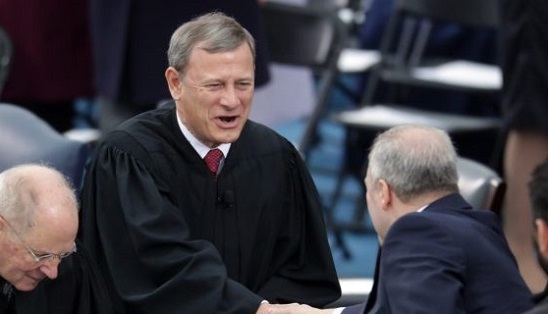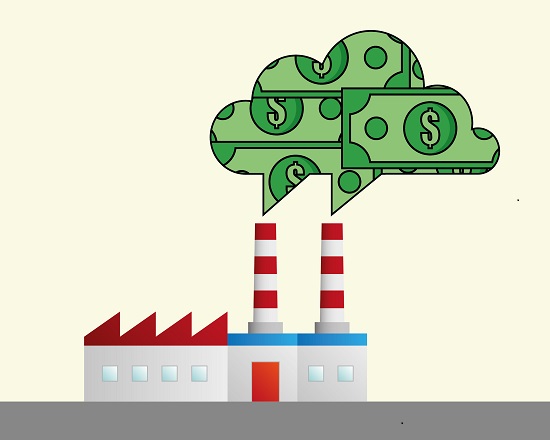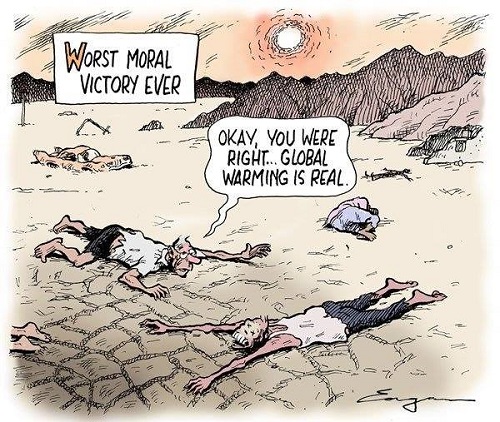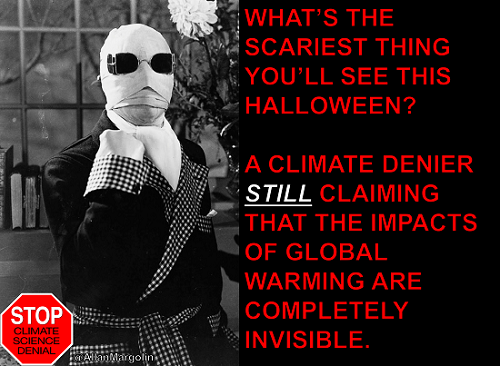
Story of the Week... Editorial of the Week... Legal Matters... Explainer of the Week... Toon of the Week... SkS in the News... Coming Soon on SkS... Climate Feedback Reviews... SkS Week in Review... Poster of the Week...
In Mexico Beach, Florida, Russell King’s house is the only beachfront property that survived Hurricane Michael with little damage. But the fact it survived the latest record-breaking hurricane doesn’t give King peace of mind. Can it withstand the next storm that comes its way?
Climate scientists predict that storms will continue to intensify, and King takes this to heart, worrying the next one could take down his house. I met King on October 14, four days after Hurricane Michael made landfall and wiped out a large portion of Mexico Beach, a small town on Florida’s panhandle. The storm swept into the area with winds of up to 155 miles per hour (mph), just two shy of reaching a Category 5 storm designation.
King’s home, which he owns with his nephew, Dr. Lebron Lackey, was built to withstand 240 mph winds, well beyond the standards of the current building code. Nearby houses built to the latest code all sustained substantial damage. Most of those still standing will likely need to be torn down. About a mile east on Highway 98, the main road along the coast, the top two floors of a four-story house moved from the beach to the road. The bottom floors were obliterated.
I was preparing to camp out in my car on the beach near King's home when he graciously invited me in. “We still have dry beds,” he said. That night we talked over candlelight about climate change and politics.
King, a former Air Force Lt. Colonel and practicing lawyer, is a Republican, but voted for Hillary Clinton in the last presidential election because he sees Donald Trump’s stance on climate science as a threat to the country. “Let’s get to the facts and truth, and don't worry about if it comes from the right or the left,“ King said.
It troubles him that people are confusing the message with the messenger when it comes to science. King pleads with his climate-denier friends to watch Al Gore’s latest film, An Inconvenient Sequel: Truth to Power, and form their own opinions, rather than going along with what politicians say.
As the sun came up, we gazed out from the balcony over the destruction below. The few structures still standing appeared damaged beyond repair. Many others were completely gone.
Man Whose Mexico Beach House Was One of Last Standing After Hurricane Michael Calls out Climate Denier Politicians by Julie Dermansky, DeSmog, Oct 21, 2018
After the panicky IPCC report on climate change, it’s easy for pessimism to set in – but that would be conceding defeat

In response to Monday’s release of the IPCC report on the climate crisis – which warned that “unprecedented” changes were needed if global warming increases 1.5C beyond the pre-industrial period – a standup comic I know posted this plaintive request on her Facebook: “Damn this latest report about climate change is just terrifying. People that know a lot about this stuff, is there anything to be potentially optimistic about? I think this week I feel even worse than Nov 2016 and I’m really trying to find some hope here.”
A bunch of her friends posted variations on “we’re doomed” and “it’s hopeless”, which perhaps made them feel that they were in charge of one thing in this overwhelming situation, the facts. They weren’t, of course. They were letting understandable grief at the news morph into an assumption that they know just how the future is going to turn out. They don’t.
The future hasn’t already been decided. That is, climate change is an inescapable present and future reality, but the point of the IPCC report is that there is still a chance to seize the best-case scenario rather than surrender to the worst. Natan Sharansky, who spent nine years in a gulag for his work with Soviet dissident Andrei Sakharov, recalls his mentor saying: “They want us to believe there’s no chance of success. But whether or not there’s hope for change is not the question. If you want to be a free person, you don’t stand up for human rights because it will work, but because it is right. We must continue living as decent people.” Right now living as decent people means every one of us with resources taking serious climate action, or stepping up what we’re already doing.
Don't despair: the climate fight is only over if you think it is, Opinion by Rebecca Solnit, Comment is Free, Guardian, Oct 14, 2018

The U.S. Supreme Court has put the brakes on the landmark youth-led climate lawsuit, Juliana v. United States.
In a one-page order issued Friday by Chief Justice John Roberts, Jr., the court granted a request made earlier this week by the Trump administration to stay discovery and trial pending review of its newly filed petition for writ of mandamus.
Roberts also ordered the plaintiffs to respond to the government’s mandamus petition no later than Wed. Oct. 24.
Trial in the case was previously set to begin on Oct. 29 in U.S. District Court in Eugene, Ore.
The Trump administration has repeatedly asked both the Supreme Court and the Ninth Circuit Court of Appeals to stop the trial via writ of mandamus, a rarely used and even more rarely granted appeal in which a higher court overrules a lower court before a verdict has been issued. The Ninth Circuit has twice turned down the request for mandamus (and a third is pending) and the Supreme Court turned down a previous one as well.
“We are confident once Chief Justice Roberts and the full Court receive the youth plaintiffs’ response to defendants’ mischaracterization of their case, the trial will proceed,” said Julia Olson, co-counsel for the young plaintiffs.
Supreme Court Grants Government’s Extraordinary Appeal, Pauses Kids Climate Case by Karen Savage, Climate Liability News, Oct 19, 2018
A carbon tax can lower emissions, but it needs to be pretty damn high.

Carbon taxes are in the news these days. In recent months, not one but two conservative national carbon tax proposals have emerged, disrupting the usual partisan dynamic on climate policy.
First there was the proposal from the Climate Leadership Council, a group of (mostly older, retired) Republicans and centrists, which was released last year but recently gained the backing of a new big-money conservative PAC. Then, in July, Rep. Carlos Curbelo (R-FL), co-chair of the House Climate Solutions Caucus, released a carbon-tax proposal of his own. Now, ExxonMobil has announced it’s endorsing the CLC proposal and is putting up $1 million to lobby for it.
Neither proposal has a snowflake’s chance in hell of passage any time soon. And the House passed a resolution this summer trying to squash even the possibility of a carbon tax. But the existence of these proposals does indicate a heightened level of awareness of and interest in carbon taxes. So now seems like a good opportunity to review some of the basics.
Luckily, the Center on Global Energy Policy (CGEP) at Columbia University (in conjunction with several other research organizations) recently issued a series of four research papers covering those basics. The research didn’t turn up anything particularly shocking; it mostly confirmed what policy wonks have long understood about the dynamics of carbon taxes.
But those dynamics aren’t necessarily well understood by the public. With the (slim but growing!) chance that a federal carbon tax could be the subject of serious national debate, it’s a good time for everyone to get up to speed.
The 5 most important questions about carbon taxes, answered by David Roberts, Energy & Climate, Vox, Oct 18, 2018

[To be Added]
Adam Voiland concludes his Earth Matters blog post artcie, The New UN Climate Report in One Sentence, with the following:
For more details, the IPCC also put together a succinct summary for policy makers, a press release, headline statements, and FAQs. Also, below are a few other good resources if you’re looking to understand some of the basics about climate change.
+NASA’s Global Climate Change Evidence Page
+NASA Earth Observatory’s Global Temperatures World of Change
+NOAA Climate Education Resources
+Skeptical Science Climate Change Myths
Voiland's Earth Matters blog is hosted on NASA's Earth Observatory website.

Posted by John Hartz on Sunday, 21 October, 2018
 |
The Skeptical Science website by Skeptical Science is licensed under a Creative Commons Attribution 3.0 Unported License. |